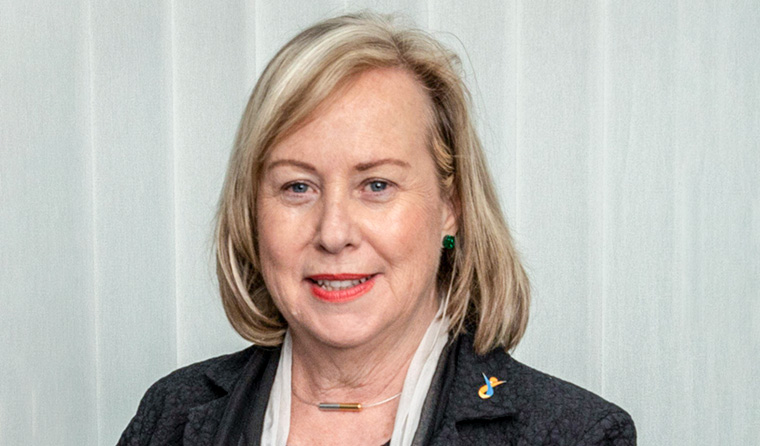Feature
Crohn’s and colitis: The invisible diseases
Crohn’s and Colitis Australia aims to highlight that inflammatory bowel diseases can have a serious impact on the mind, as well as the gut.
 Amy Benn, nurse, personal trainer and person with Crohn’s disease, has managed to thrive despite the challenges of living with IBD.
Amy Benn, nurse, personal trainer and person with Crohn’s disease, has managed to thrive despite the challenges of living with IBD.
Crohn’s disease and ulcerative colitis, collectively known as inflammatory bowel disease (IBD), are serious and chronic, causing symptoms such as abdominal pain, diarrhoea, bleeding and fevers.
But because their impacts are largely internal, they can be hard for other people – sometimes even health professionals – to perceive.
This was something Amy Benn, a registered nurse and personal trainer who was diagnosed with Crohn’s disease at 14 years old, found during her journey to diagnosis.
‘As a teenager, I wanted to live a normal life and I just kept going, I was quite persistent,’ she told newsGP. ‘It was a slow leak in the tank, and I was coping quite well with it – even though I could hardly drag myself up and down the basketball court, and was sleeping every day when I came home from school.
‘But when my Mum saw how much blood I was losing every time I went to the bathroom, she took me straight to emergency. I walked in looking relatively fine, so they told me to go home, “Go back and see your GP”, and my poor Mum was like, “I have, you don’t understand, you don’t know how much blood she’s losing”.’
However, when Ms Benn was finally diagnosed with Crohn’s, it became very clear the serious impact it would potentially have on her life.
‘I was told I would never have a family of my own, I’d probably never do lots of travelling, I’d probably never have a great career, I’d probably always be dependent on my parents,’ she said.
As a result of IBD’s challenging symptoms and the difficulty of gaining others’ understanding, many patients with Crohn’s and colitis can experience negative impacts on their mental health, as Crohn’s and Colitis Australia (CCA) found in its recent national survey on IBD patient experience.
‘We actually assessed 52% of the people surveyed – that’s one in two – as being in psychological distress. We were quite surprised with that,’ Chief Executive of CCA, Associate Professor Leanne Raven, told newsGP.
‘The other thing we found was that most people had an IBD specialist on their team, but only about 12% had a psychologist or a mental health [support] person.
‘We also asked participants if they had been asked about their mental health when talking with their treating practitioners, and 16% said they had been asked, while 57% said they wanted to be asked.
‘So I think there are real lessons for, not only the community in terms of understanding and raising awareness, but also for health professionals, generally, to just apply [mental health] screening tools.’

CEO of Crohn’s and Colitis Australia, Associate Professor Leanne Raven, wants to highlight the psychological as well as physical impacts of IBD.
During Crohn’s and Colitis Awareness month, Associate Professor Raven wants to emphasise the importance of remembering the psychological as well as physical side of living with IBD, especially for GPs, who are crucial to the diagnosis and management of these diseases.
‘Include simple, mental health screening tools when seeing people with IBD,’ she said. ‘We know early diagnosis is really important, so it needs to be actioned as soon as possible, and get them up to specialist care.
‘And when they’re coming back for other health problems, just keep a watch with that mental health screening – and raise the subject with people. Because [mental health] is an important part of this team of support that all people living with these diseases need.’
Another tip that is important in the treatment of IBD patients is a simple one: to listen, and understand the impacts of the disease.
‘Because there’s such an interest in gut health, everyone’s got a story to tell about irritable bowel syndrome or why they don’t eat certain foods, and so they’ve all got advice, but all of that stuff is just not relevant at all,’ Associate Professor Raven said.
‘So we’re encouraging people to listen more, and just be aware that these people with these serious gut illnesses, they’re not just having tummy troubles that a little bit of diet modification is going to change.’
To assist patients, GPs and other health professionals in these efforts, Crohn’s and Colitis Australia has developed a psychological Wellbeing Toolkit, available through its website.
‘It contains simple tips around psychological wellbeing,’ Associate Professor Raven explained. ‘If GPs download that to have in their waiting rooms and give to patients, that would be really great.’
The ultimate aim of CCA’s awareness raising is to help people with IBD live fulfilling lives, in spite of the challenges they face on an everyday basis. And Ms Benn, who has gone on to defy her bleak diagnosis at the age of 14, is ample proof that this can be achieved.
‘It’s been my mission in life, really, to prove [the diagnosis] wrong, just in a way that I took one step outside the box and it felt really good,’ she said.
‘I have a mortgage, I have a career, I have a wonderful husband. I’ve even doubled in body building and Olympic triathlons and half-marathons, as well, just to really understand that the body is capable of achieving wonderful things if you learn to self-manage, listen to the feedback it’s giving you, and put it in the optimal environment to thrive.’
Crohn’s and colitis IBD Inflammatory bowel disease
newsGP weekly poll
As a GP, do you use any resources or visit a healthcare professional to support your own mental health and wellbeing?